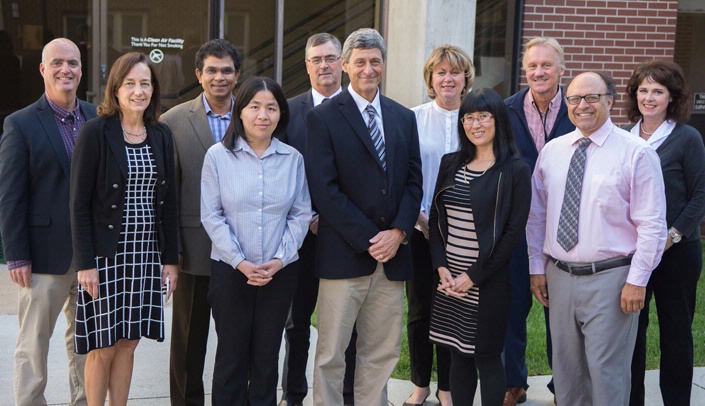A team of UNMC researchers headed by Matthew Rizzo, M.D., professor and chair of the department of neurological sciences, has landed the largest grant ever for UNMC — a five-year research grant from the National Institutes of Health totaling nearly $20 million.
Noon Celebrating Research event will discuss new network
As part of this month’s Celebrating Research activities, join Matthew Rizzo M.D., Institutional Development Award (IDeA)-Clinical Translational Research (CTR) principal investigator, to learn how the IDeA-CTR aims to develop the next generation of CTR researchers, providing opportunities through scholar and pilot project grants.
The event will run from noon to 1 p.m. today at the Sorrell Center, Room 2018.
This Celebrating Research event will be live-streamed and recorded.
Funding is provided through the Institutional Development Award (IDeA) program and the NIH’s National Institute of General Medical Studies. It will focus on developing early career researchers into independent scientists and increasing the infrastructure and other resources needed to support clinical/translational research (CTR) around the region.
The grant will create the Great Plains IDeA-CTR Network, a collaboration involving nine institutions in four states — Nebraska, North Dakota, South Dakota and Kansas.
In addition to UNMC, the Nebraska institutions include the University of Nebraska-Lincoln, University of Nebraska at Omaha, University of Nebraska at Kearney and Boys Town National Research Hospital. Other participants include the University of South Dakota, University of North Dakota, North Dakota State University, and the University of Kansas Medical Center.
“This is a huge accomplishment for our institution,” said Chancellor Jeffrey P. Gold, M.D. “It’s never easy to compete for a research grant of this magnitude. It represents years of hard work by lots of dedicated individuals. We couldn’t be more proud. This is truly a great day for UNMC and for our research partners.”
“We’ve been building clinical/translational research resources steadily for almost a decade to prepare us to compete for this or other large clinical/translational grant awards,” said Jennifer Larsen, M.D., vice chancellor for research. “Receiving this award shows we ‘have arrived,’ and the award itself will further expand the resources available for our faculty to continue to successfully compete on a national level.”
The grant will be particularly focused on expanding knowledge about approaches needed to address diseases of aging and brain health, Dr. Rizzo said.
Institutional Development Award (IDeA)
The Institutional Development Award (IDeA) program broadens the geographic distribution of NIH funding for biomedical research.
The program fosters health-related research and enhances the competitiveness of investigators at institutions located in states in which the aggregate success rate for applications to NIH has historically been low.
The CTR program allows IDeA states to develop infrastructure and capacity to conduct clinical and translational research on diseases that are prevalent in their population. It is designed to focus on meeting the needs of unique populations such as rural and medically underserved communities.
The IDeA-CTR program increases the competitiveness of investigators by supporting faculty development and research infrastructure. It further provides for mentoring and career development activities in clinical and translational research.
“The states involved in our grant are rural states, so we will put extra emphasis on projects that will benefit people in rural areas or the medically underserved,” he said. “There is a strong aspect of community engagement. There are many good ideas that need to be studied. We can’t wait to get going and recruit our first class of scholars and launch our first pilot projects.”
A community engagement core group has been formed, Dr. Rizzo said. It is an interprofessional group that includes investigators from the colleges of medicine, nursing and public health at UNMC as well as researchers from the other participating institutions and the communities they serve.
“The goal of this grant is to help early career scientists to become independent and launch their own research programs,” Dr. Rizzo said. “We want to fill in the health gaps in the Great Plains area. We have unique needs. We have areas with relatively few people in big spaces, as well as medically underserved populations in urban areas.”
“This is all about improving the body of knowledge,” said Howard Fox, M.D., Ph.D., senior associate dean of UNMC research and development and a professor of pharmacology and experimental neuroscience. “We do research that helps people. What that research will be is determined by the talented scientists at our participating institutions.”
UNMC’s largest previous grant – also from the NIH IDeA program – was a $17.2 million grant awarded in 2009 to James Turpen, Ph.D., associate vice chancellor for academic affairs. The grant was renewed in 2015 for $16.2 million.

Wow, truly an amazing accomplishment. Congratulations to all.
Congratulations!
Jim Padbury, Brown University
Great news! Congrats to all who made this possible!
Awesome news! Dr Rizzo has been an inspirational leader for the Department of Neurological Sciences and the whole campus! Very proud of the entire team!
Amazing! I continue to be impressed with UNMC's amazing accomplishments!
Amazing! Congrats Dr. Rizzo, Dr. Fox, and the rest of the team!
Congrats!
Congratulations and kudos to the entire team (in the photo and those behind the scenes). Feel proud and honored to see two of mentors be a part of this initiative. God speed and good luck!
– COPH alumni and recent Ph.D. graduate: Ketki Patel